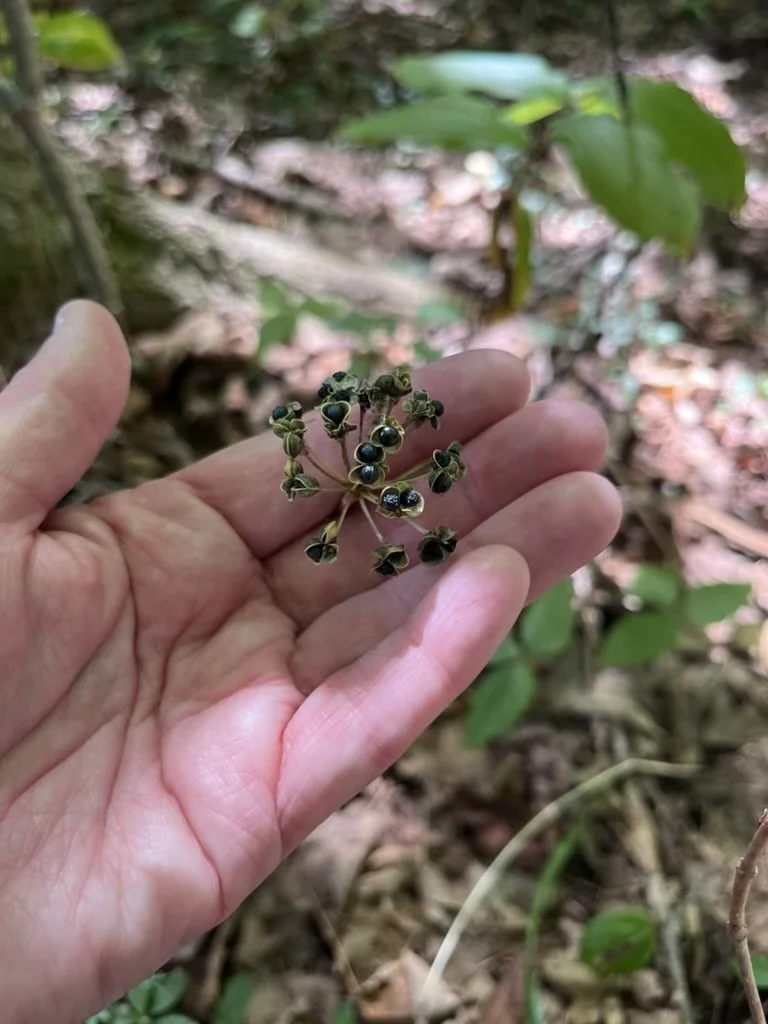
Propagation &
Seed Purchasing Program
Establishing robust sources for locally adapted planting stock across the Northeast
In collaboration with Smokey House Center and other regional partners, we’re working to create a network of propagation hubs to provide reliable and sustainable sources of locally adapted planting stock for forest-farmed and other agroforestry crops. If you have a robust local population of forest farming species of interest and can sustainably collect seed, we will purchase it from you to plant at Smokey House Center’s forest farming propagation hub.
Seed Collection & Purchasing Program
Preparation & Planning
If you are collecting seed on land that does not belong to you, you will need to acquire permission from the landowner to collect there. We only purchase seed collected with landowner permission.
Identify the target plant for collection and locations of population occurrences within the site. Estimate the population size and percent of reproductive individuals to confirm the population is large and robust. Determining reproductive individuals is easiest when plants are in flower. Record the location of the population with GPS coordinates, notable landmarks, etc.
Connect with NFFC and Smokey House Center staff to ensure the population you will collect from is sizable and robust enough for collection and confirm species-specific best practices, including proper season, cleaning, packing, and shipping protocol.
Gather the following supplies with you into the field:
Paper and writing utensils for labelling and recording population and site details
Envelopes and paper or plastic bags for seed collection
Tape to secure envelopes and bags for small seed
Water, snacks, maps, camera, field guide, hand lens, pruners, protective clothing and safety/first aid gear (sunscreen, bug spray, proper footwear, gloves, etc.)
Collection & Labelling
Navigate to the population occurrences and confirm the quantity and quality of plants is appropriate for sustainable collection. Collect no more than 20% of ripe seeds from at least 50 individual plants of varying sizes, following general and species-specific seed collection guidelines. Store cleaned seeds in paper envelopes and fleshy fruits in plastic bags, storing in a dry, cool place and refrigerating if necessary. For more collection instructions, visit our seed collection guidelines page.
Print out the NFFC Seed Collection Information Slip and fill out for each population. Ensure all bags and envelopes are clearly labelled with identifying information.
Shipping & Payment
Mail seeds no more than two days after collection to:
Smokey House Center
Attn: Seed Purchasing Program
426 Danby Mountain Road
Danby, VT 05739
Include your mailing address so we can send payment upon receipt in the form of a check. We ask seed collectors to send us a minimum of 50 seeds per population. See our price list and species of interest list below. Note that we only accept seed during the time of year when a species’ seed is ripe for collection.

2025 Price List by Species
Bloodroot seed (Sanguinaria canadensis)
$7.50 / 50 seeds
Ramps (Allium tricoccum)
$6.00 / 50 seeds
Solomon’s seal (Polyganatum biflorum)
$7.50 / 50 seeds
Black cohosh (Actaea racemosa)
$5.00 / 50 seeds
Blue cohosh (Caulophyllum thalictroides)
$13.50 / 50 seeds
Wild ginger (Asarum canadense)
$11.50 / 50 seeds
Mayapple (Podophyllum peltatum)
$15.00 / 50 seeds
At this time, we are not purchasing ginseng (Panax quinquefolius) or goldenseal (Hydrastis canadensis) seed due to their status as listed under Appendix II of the Convention on International Trade of Endangered Species (CITES). If you have questions about seed from these or other species, get in touch with the team at northeastforestfarming@gmail.com.

